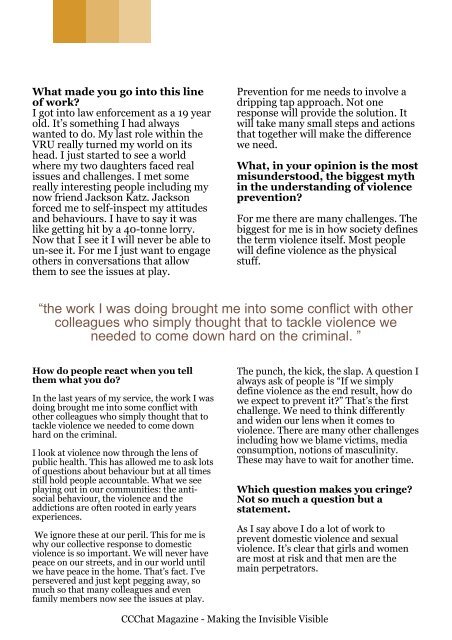CCChat-Magazine_3
Create successful ePaper yourself
Turn your PDF publications into a flip-book with our unique Google optimized e-Paper software.
What made you go into this line<br />
of work?<br />
I got into law enforcement as a 19 year<br />
old. It’s something I had always<br />
wanted to do. My last role within the<br />
VRU really turned my world on its<br />
head. I just started to see a world<br />
where my two daughters faced real<br />
issues and challenges. I met some<br />
really interesting people including my<br />
now friend Jackson Katz. Jackson<br />
forced me to self-inspect my attitudes<br />
and behaviours. I have to say it was<br />
like getting hit by a 40-tonne lorry.<br />
Now that I see it I will never be able to<br />
un-see it. For me I just want to engage<br />
others in conversations that allow<br />
them to see the issues at play.<br />
Prevention for me needs to involve a<br />
dripping tap approach. Not one<br />
response will provide the solution. It<br />
will take many small steps and actions<br />
that together will make the difference<br />
we need.<br />
What, in your opinion is the most<br />
misunderstood, the biggest myth<br />
in the understanding of violence<br />
prevention?<br />
For me there are many challenges. The<br />
biggest for me is in how society defines<br />
the term violence itself. Most people<br />
will define violence as the physical<br />
stuff.<br />
“the work I was doing brought me into some conflict with other<br />
colleagues who simply thought that to tackle violence we<br />
needed to come down hard on the criminal. ”<br />
How do people react when you tell<br />
them what you do?<br />
In the last years of my service, the work I was<br />
doing brought me into some conflict with<br />
other colleagues who simply thought that to<br />
tackle violence we needed to come down<br />
hard on the criminal.<br />
I look at violence now through the lens of<br />
public health. This has allowed me to ask lots<br />
of questions about behaviour but at all times<br />
still hold people accountable. What we see<br />
playing out in our communities: the antisocial<br />
behaviour, the violence and the<br />
addictions are often rooted in early years<br />
experiences.<br />
We ignore these at our peril. This for me is<br />
why our collective response to domestic<br />
violence is so important. We will never have<br />
peace on our streets, and in our world until<br />
we have peace in the home. That’s fact. I’ve<br />
persevered and just kept pegging away, so<br />
much so that many colleagues and even<br />
family members now see the issues at play.<br />
The punch, the kick, the slap. A question I<br />
always ask of people is “If we simply<br />
define violence as the end result, how do<br />
we expect to prevent it?” That’s the first<br />
challenge. We need to think differently<br />
and widen our lens when it comes to<br />
violence. There are many other challenges<br />
including how we blame victims, media<br />
consumption, notions of masculinity.<br />
These may have to wait for another time.<br />
Which question makes you cringe?<br />
Not so much a question but a<br />
statement.<br />
As I say above I do a lot of work to<br />
prevent domestic violence and sexual<br />
violence. It’s clear that girls and women<br />
are most at risk and that men are the<br />
main perpetrators.<br />
<strong>CCChat</strong> <strong>Magazine</strong> - Making the Invisible Visible


















